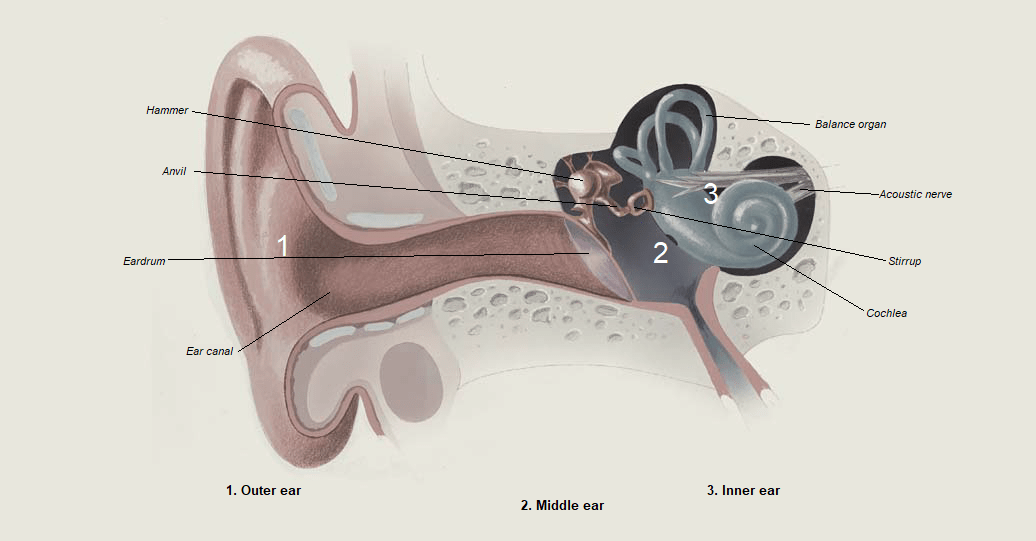
How Does Hearing Work and What Causes Hearing Loss?
Your hearing keeps you connected to the world around you - it helps to keep you safe, to build relationships and understand your surroundings. So, when you suspect you may be suffering a hearing loss, it can be a very frightening realisation. But what actually causes hearing loss?
Created Updated
Living with a hearing loss
How does your hearing work?
- Sound creates vibrations in the air that are picked up by the eardrum;
- When the eardrum vibrates, tiny bones inside the middle ear also vibrate, transmitting the vibrations across the middle ear to the inner ear;
This causes fluid in the inner ear to move; - When fluid moves in the inner ear, it stimulates the nerve cells inside this part of the ear;
- These nerve cells then send impulses to the brain along the "hearing nerve," the brain interprets the impulses, and we then hear the sound.
Understanding hearing loss
When there is damage to any part of the path that sound takes through the hearing system, hearing ability may be compromised. Hearing loss can mean many things, from the slight inability to hear birds sing to total deafness. Hearing loss is divided into two distinctive types, which can help assess the correct kind of treatment you may be eligible for if you're experiencing hearing loss.
Conductive Hearing Loss
Conductive hearing loss is localised to the outer or middle ear and occurs when sounds cannot be transmitted from your outer ear to your inner ear, often because of a blockage. Symptoms include sounds becoming quieter and sometimes muffled and difficulty in hearing softer sounds at all pitches.
Conductive hearing loss can sometimes be treated medically or surgically, but will often need to be corrected with hearing aids.
This hearing loss can be temporary or permanent.
Causes of Conductive Hearing Loss
Conductive hearing loss can be caused by the following factors:
Accumulation of ear wax within the ear canal;
Many episodes of middle ear infection (otitis media);
Chronic infection;
A growth in the middle ear (cholesteatoma) or;
An abnormal bone growth near the middle ear (otosclerosis).
Sensorineural Hearing Loss
When the loss is caused by a problem involving the inner ear (cochlea/auditory nerve), it is considered a sensorineural hearing loss.
This type of loss occurs when the hair cells in the inner ear, neural fibres or their connections to the cochlea (inner ear) are damaged or do not function optimally. Symptoms include reduced sensitivity to soft sounds, difficulty distinguishing among different speech signals and a reduced perception of loudness.
Sensorineural hearing loss can rarely be reversed by medical or surgical procedure, but can often be helped with hearing aids.
This kind of hearing loss is permanent.
Causes of Sensorineural Hearing Loss
Sensorineural hearing loss can be caused by the following factors:
Aging - a main cause of all types of hearing loss. The first signs of progressive hearing loss can be problems in understanding speech in background noise. It tends to develop at the age of about 60 years and onwards.
Noise exposure - loud noise exposure can lead to damage in the inner ear. Noise Induced hearing loss (NIHL) can occur either over a long period of time (e.g. working in a noisy factory) or due to a single exposure to very loud sound (such as an explosion or even a concert).
Genetic conditions - Genetic sensorineural hearing loss, caused by a mutated gene, may affect infants from birth or develop later in life, and may have been in the family for generations or appear for the first time in a family without a history of deafness.
Congenital and birth-related hearing loss - Injections during pregnancy, complications during birth, premature birth, and hereditary predispositions can all cause sensorineural hearing loss in newborns.
Drugs and medication - Sensorineural hearing loss can be a side-effect of certain medications and cancer treatment.
Mixed hearing loss
It is possible to have a combination of both conductive and sensorineural hearing loss – this is known as mixed hearing loss.
Hearing care professionals recommend getting your hearing tested every two years – regular check-ups can help you identify a problem sooner, and with earlier treatment, hearing loss is less likely to impact other areas of your health and well-being.
To find a hearing care professional near you, please click here.